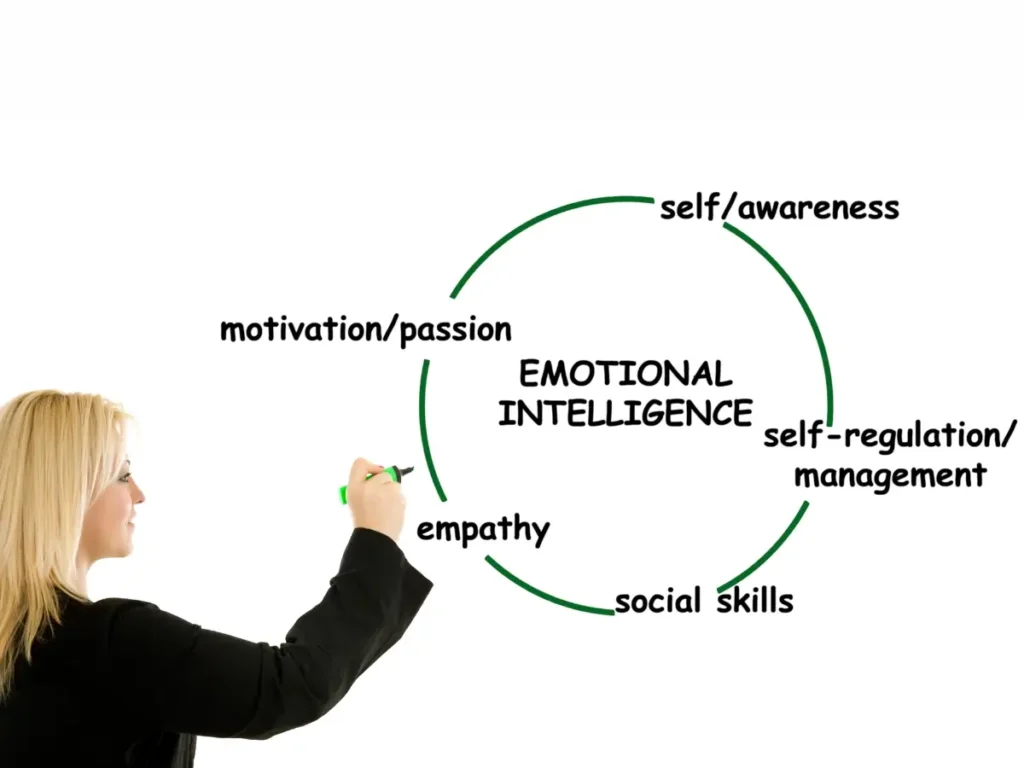Have you ever wondered why some people seem to glide through difficult conversations while others stumble? Or why certain colleagues get promoted faster, even when they’re not the smartest person in the room?
The answer often comes down to one crucial skill that schools never taught us: emotional intelligence.
I’ve watched brilliant people derail their careers because they couldn’t read a room, and I’ve seen average performers become exceptional leaders simply because they understood emotions—both their own and others’. The truth is, your EQ (emotional quotient) might be more important than your IQ when it comes to real-world success.
In this guide, I’ll walk you through everything you need to know about emotional intelligence, from Daniel Goleman’s groundbreaking research to practical ways you can strengthen your emotional skills starting today. Whether you’re looking to improve your relationships, advance your career, or simply understand yourself better, mastering these five core components will change how you navigate the world.
Let’s dive in.
Table of Contents
What Is the Meaning of Emotional Intelligence?
Emotional intelligence is the power to recognize, understand, and manage emotions—both your own and those of others. Think of it as your emotional GPS system, helping you navigate the complex world of human feelings and social interactions.
But here’s what makes EQ so powerful: it’s not about suppressing emotions or being “nice” all the time. Instead, it’s about developing emotional awareness and using that insight to make better decisions, build stronger relationships, and respond to challenges with clarity rather than chaos.
Research consistently shows that people with high emotional intelligence earn more money, have better relationships, and experience less stress. They’re the colleagues who stay calm under pressure, the friends who always know what to say, and the leaders who inspire rather than intimidate.
The beautiful thing about emotional intelligence? Unlike IQ, which remains relatively fixed throughout life, your EQ can be developed and improved at any age. You’re not stuck with the emotional skills you have today.
The 5 Components of Emotional Intelligence

Emotional intelligence isn’t just one skill it’s actually five interconnected abilities that work together like instruments in an orchestra. Master these five components, and you’ll have the emotional skills to handle almost any situation life throws at you.
1. Self-Awareness
This is your foundation. Self-awareness means understanding your emotions as they happen and recognizing how they affect your thoughts and behavior. It’s that moment when you catch yourself getting frustrated in traffic and think, “Okay, I’m stressed about being late, but taking it out on other drivers won’t help.”
2. Self-Regulation
Once you’re aware of your emotions, self-regulation is your ability to manage them effectively. This doesn’t mean bottling up feelings—it means choosing how to express them in ways that are appropriate and constructive.
3. Motivation
This component goes beyond external rewards. It’s about having internal drive, optimism, and commitment to your goals even when things get tough. Emotionally intelligent people bounce back from setbacks because they’re motivated by personal growth, not just external validation.
4. Empathy
Empathy is the ability to sense and connect with what others are feeling, truly understanding their emotions as if they were your own. It’s what helps you pick up on unspoken emotions, read between the lines in conversations, and respond to people’s needs even when they haven’t explicitly stated them.
5. Social Skills
This is where everything comes together. Social skills involve using your emotional awareness to build relationships, communicate effectively, resolve conflicts, and influence others in positive ways.
These five components work together seamlessly. You can’t have strong social skills without empathy, and self-regulation becomes much easier when you have solid self-awareness.
Daniel Goleman’s Emotional Intelligence Theory
You can’t talk about emotional intelligence without mentioning Daniel Goleman, the psychologist who brought this concept into mainstream consciousness with his bestselling 1995 book “Emotional Intelligence.”
Goleman’s research was revolutionary because it challenged the traditional belief that cognitive intelligence (IQ) was the primary predictor of success. Instead, he demonstrated that emotional intelligence often matters more than raw intellectual ability, especially in leadership roles and interpersonal relationships.
His work built on earlier research by psychologists Peter Salovey and John Mayer, but Goleman made the concept accessible to everyone. He showed how emotionally intelligent people excel in four key domains:
- Self-awareness and self-management (personal competencies)
- Social awareness and relationship management (social competencies)
What makes Goleman’s theory so compelling is the data behind it. His research revealed that emotional intelligence makes up 58% of job performance in every industry. Even more impressive—90% of top performers score high in emotional intelligence.
This isn’t just feel-good psychology—it’s practical science that explains why some people thrive while others struggle, regardless of their technical skills or education level.
Key Traits of Emotionally Intelligent People
So what do emotionally intelligent people actually look like in real life? You probably know a few without even realizing it. These are the people who seem to have a special knack for handling difficult situations with grace and connecting with others on a deeper level.
Here are the telltale traits that emotionally intelligent people share:
They listen more than they speak. Instead of waiting for their turn to talk, they genuinely focus on understanding what others are saying—and more importantly, what they’re feeling.
They stay curious about emotions. Rather than judging feelings (their own or others’), they approach emotions with curiosity. They ask themselves questions like, “Why do I feel this way?” or “What might be behind their reaction?”
They admit their mistakes quickly. Emotionally intelligent people don’t let ego get in the way of growth. When they mess up, they acknowledge it, learn from it, and move forward without dwelling on shame or blame.
They manage stress without losing their cool. Everyone feels overwhelmed sometimes, but people with high EQ have healthy coping strategies. They might take a deep breath, go for a walk, or talk through their feelings instead of exploding or shutting down.
They read the room instinctively. They pick up on subtle social cues—a slight change in tone, crossed arms, or a forced smile—and adjust their approach accordingly.
They give genuine compliments and constructive feedback. They know how to make people feel valued while also helping them grow. Their praise feels authentic, and their criticism feels supportive rather than attacking.
These traits aren’t innate superpowers—they’re learned skills that anyone can develop with practice and intention.
How to Apply and Improve Emotional Intelligence in Daily Life
The good news about emotional intelligence? You can start strengthening it today with simple, practical exercises that fit into your regular routine.
Start with the pause. Before reacting to any emotional situation, take a breath and ask yourself: “What am I feeling right now, and why?” This simple habit builds self-awareness and gives you space to choose your response instead of reacting automatically.
Practice the name-it-to-tame-it technique. When you notice an emotion, put a specific label on it. Instead of “I feel bad,” try “I feel disappointed” or “I feel overwhelmed.” Research shows that naming emotions actually reduces their intensity and helps you process them more effectively.
Become an emotion detective with others. Throughout your day, pay attention to the emotional undercurrents in conversations. Notice body language, tone of voice, and what people aren’t saying. Practice reflecting back what you observe: “It sounds like you’re feeling frustrated about this situation.”
Keep an emotion journal. Spend five minutes each evening writing about the emotions you experienced that day. What triggered them? How did you handle them? What would you do differently? This builds self-awareness and helps you spot patterns in your emotional responses.
Practice empathy through perspective-taking. When someone irritates you, try to understand their point of view. What pressures might they be under? What fears or needs could be driving their behavior? This doesn’t mean excusing bad behavior, but it helps you respond with wisdom rather than react with anger.
Set emotional goals alongside your regular goals. Maybe you want to get better at staying calm during conflicts, or you want to become more skilled at giving feedback. Treat these emotional skills like any other skill you’d practice—with intention and consistency.
The key is to start small and be patient with yourself. Emotional intelligence develops over time through real-world practice, not overnight transformation.
Master Your Emotional Intelligence for a Better Life
Emotional intelligence isn’t just a nice-to-have skill—it’s essential for thriving in our increasingly connected world. Whether you’re navigating workplace dynamics, strengthening personal relationships, or simply trying to understand yourself better, these five components give you a roadmap for growth.
Remember, developing your EQ is a journey, not a destination. Every conversation is an opportunity to practice empathy. Every challenging emotion is a chance to build self-awareness. Every conflict is an opportunity to improve your social skills.
The people who master emotional intelligence don’t just succeed—they help others succeed too. They create positive ripple effects in their families, workplaces, and communities.

